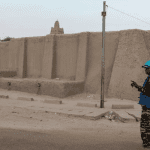The return of state authority to the north is meant to fill a power vacuum that has turned northern Mali into a launch pad for jihadi attacks across a vast region on the Sahara Desert.
Most government posts have been unfilled since ethnic Tuareg separatists and desert jihadists took over northern Mali in 2012, before French forces intervened to push them back. A peace deal signed in 2015 was meant to enable authorities to return.
Pro and anti-government Tuareg-dominated factions had finally agreed in February on how this would happen, after months of arguments over how the authorities should be constituted.
They returned to Gao and Kidal two weeks later, but some armed groups prevented them from setting up in Timbuktu and Menaka at the beginning of March.
State TV announced on a news bulletin that the impasse was over. A spokesman for the anti-government Tuaregs, Iyad Ag Mohamed, confirmed by telephone that the authorities had been allowed in.
“Everyone feels that a big step has been made and thinks that peace will now come,” Timbuktu resident Moulaye Haidara told Reuters by telephone.
Despite such encouraging moves toward peace, Mali mains plagued by banditry and deadly Islamist attacks.
The return of state authority to the north is meant to fill a power vacuum that has turned northern Mali into a launch pad for jihadi attacks across a vast region on the Sahara Desert.
Most government posts have been unfilled since ethnic Tuareg separatists and desert jihadists took over northern Mali in 2012, before French forces intervened to push them back. A peace deal signed in 2015 was meant to enable authorities to return.
Pro and anti-government Tuareg-dominated factions had finally agreed in February on how this would happen, after months of arguments over how the authorities should be constituted.
They returned to Gao and Kidal two weeks later, but some armed groups prevented them from setting up in Timbuktu and Menaka at the beginning of March.
State TV announced on a news bulletin that the impasse was over. A spokesman for the anti-government Tuaregs, Iyad Ag Mohamed, confirmed by telephone that the authorities had been allowed in.
“Everyone feels that a big step has been made and thinks that peace will now come,” Timbuktu resident Moulaye Haidara told Reuters by telephone.
Despite such encouraging moves toward peace, Mali mains plagued by banditry and deadly Islamist attacks.
The return of state authority to the north is meant to fill a power vacuum that has turned northern Mali into a launch pad for jihadi attacks across a vast region on the Sahara Desert.
Most government posts have been unfilled since ethnic Tuareg separatists and desert jihadists took over northern Mali in 2012, before French forces intervened to push them back. A peace deal signed in 2015 was meant to enable authorities to return.
Pro and anti-government Tuareg-dominated factions had finally agreed in February on how this would happen, after months of arguments over how the authorities should be constituted.
They returned to Gao and Kidal two weeks later, but some armed groups prevented them from setting up in Timbuktu and Menaka at the beginning of March.
State TV announced on a news bulletin that the impasse was over. A spokesman for the anti-government Tuaregs, Iyad Ag Mohamed, confirmed by telephone that the authorities had been allowed in.
“Everyone feels that a big step has been made and thinks that peace will now come,” Timbuktu resident Moulaye Haidara told Reuters by telephone.
Despite such encouraging moves toward peace, Mali mains plagued by banditry and deadly Islamist attacks.
The return of state authority to the north is meant to fill a power vacuum that has turned northern Mali into a launch pad for jihadi attacks across a vast region on the Sahara Desert.
Most government posts have been unfilled since ethnic Tuareg separatists and desert jihadists took over northern Mali in 2012, before French forces intervened to push them back. A peace deal signed in 2015 was meant to enable authorities to return.
Pro and anti-government Tuareg-dominated factions had finally agreed in February on how this would happen, after months of arguments over how the authorities should be constituted.
They returned to Gao and Kidal two weeks later, but some armed groups prevented them from setting up in Timbuktu and Menaka at the beginning of March.
State TV announced on a news bulletin that the impasse was over. A spokesman for the anti-government Tuaregs, Iyad Ag Mohamed, confirmed by telephone that the authorities had been allowed in.
“Everyone feels that a big step has been made and thinks that peace will now come,” Timbuktu resident Moulaye Haidara told Reuters by telephone.
Despite such encouraging moves toward peace, Mali mains plagued by banditry and deadly Islamist attacks.
The return of state authority to the north is meant to fill a power vacuum that has turned northern Mali into a launch pad for jihadi attacks across a vast region on the Sahara Desert.
Most government posts have been unfilled since ethnic Tuareg separatists and desert jihadists took over northern Mali in 2012, before French forces intervened to push them back. A peace deal signed in 2015 was meant to enable authorities to return.
Pro and anti-government Tuareg-dominated factions had finally agreed in February on how this would happen, after months of arguments over how the authorities should be constituted.
They returned to Gao and Kidal two weeks later, but some armed groups prevented them from setting up in Timbuktu and Menaka at the beginning of March.
State TV announced on a news bulletin that the impasse was over. A spokesman for the anti-government Tuaregs, Iyad Ag Mohamed, confirmed by telephone that the authorities had been allowed in.
“Everyone feels that a big step has been made and thinks that peace will now come,” Timbuktu resident Moulaye Haidara told Reuters by telephone.
Despite such encouraging moves toward peace, Mali mains plagued by banditry and deadly Islamist attacks.
The return of state authority to the north is meant to fill a power vacuum that has turned northern Mali into a launch pad for jihadi attacks across a vast region on the Sahara Desert.
Most government posts have been unfilled since ethnic Tuareg separatists and desert jihadists took over northern Mali in 2012, before French forces intervened to push them back. A peace deal signed in 2015 was meant to enable authorities to return.
Pro and anti-government Tuareg-dominated factions had finally agreed in February on how this would happen, after months of arguments over how the authorities should be constituted.
They returned to Gao and Kidal two weeks later, but some armed groups prevented them from setting up in Timbuktu and Menaka at the beginning of March.
State TV announced on a news bulletin that the impasse was over. A spokesman for the anti-government Tuaregs, Iyad Ag Mohamed, confirmed by telephone that the authorities had been allowed in.
“Everyone feels that a big step has been made and thinks that peace will now come,” Timbuktu resident Moulaye Haidara told Reuters by telephone.
Despite such encouraging moves toward peace, Mali mains plagued by banditry and deadly Islamist attacks.
The return of state authority to the north is meant to fill a power vacuum that has turned northern Mali into a launch pad for jihadi attacks across a vast region on the Sahara Desert.
Most government posts have been unfilled since ethnic Tuareg separatists and desert jihadists took over northern Mali in 2012, before French forces intervened to push them back. A peace deal signed in 2015 was meant to enable authorities to return.
Pro and anti-government Tuareg-dominated factions had finally agreed in February on how this would happen, after months of arguments over how the authorities should be constituted.
They returned to Gao and Kidal two weeks later, but some armed groups prevented them from setting up in Timbuktu and Menaka at the beginning of March.
State TV announced on a news bulletin that the impasse was over. A spokesman for the anti-government Tuaregs, Iyad Ag Mohamed, confirmed by telephone that the authorities had been allowed in.
“Everyone feels that a big step has been made and thinks that peace will now come,” Timbuktu resident Moulaye Haidara told Reuters by telephone.
Despite such encouraging moves toward peace, Mali mains plagued by banditry and deadly Islamist attacks.
The return of state authority to the north is meant to fill a power vacuum that has turned northern Mali into a launch pad for jihadi attacks across a vast region on the Sahara Desert.
Most government posts have been unfilled since ethnic Tuareg separatists and desert jihadists took over northern Mali in 2012, before French forces intervened to push them back. A peace deal signed in 2015 was meant to enable authorities to return.
Pro and anti-government Tuareg-dominated factions had finally agreed in February on how this would happen, after months of arguments over how the authorities should be constituted.
They returned to Gao and Kidal two weeks later, but some armed groups prevented them from setting up in Timbuktu and Menaka at the beginning of March.
State TV announced on a news bulletin that the impasse was over. A spokesman for the anti-government Tuaregs, Iyad Ag Mohamed, confirmed by telephone that the authorities had been allowed in.
“Everyone feels that a big step has been made and thinks that peace will now come,” Timbuktu resident Moulaye Haidara told Reuters by telephone.
Despite such encouraging moves toward peace, Mali mains plagued by banditry and deadly Islamist attacks.













